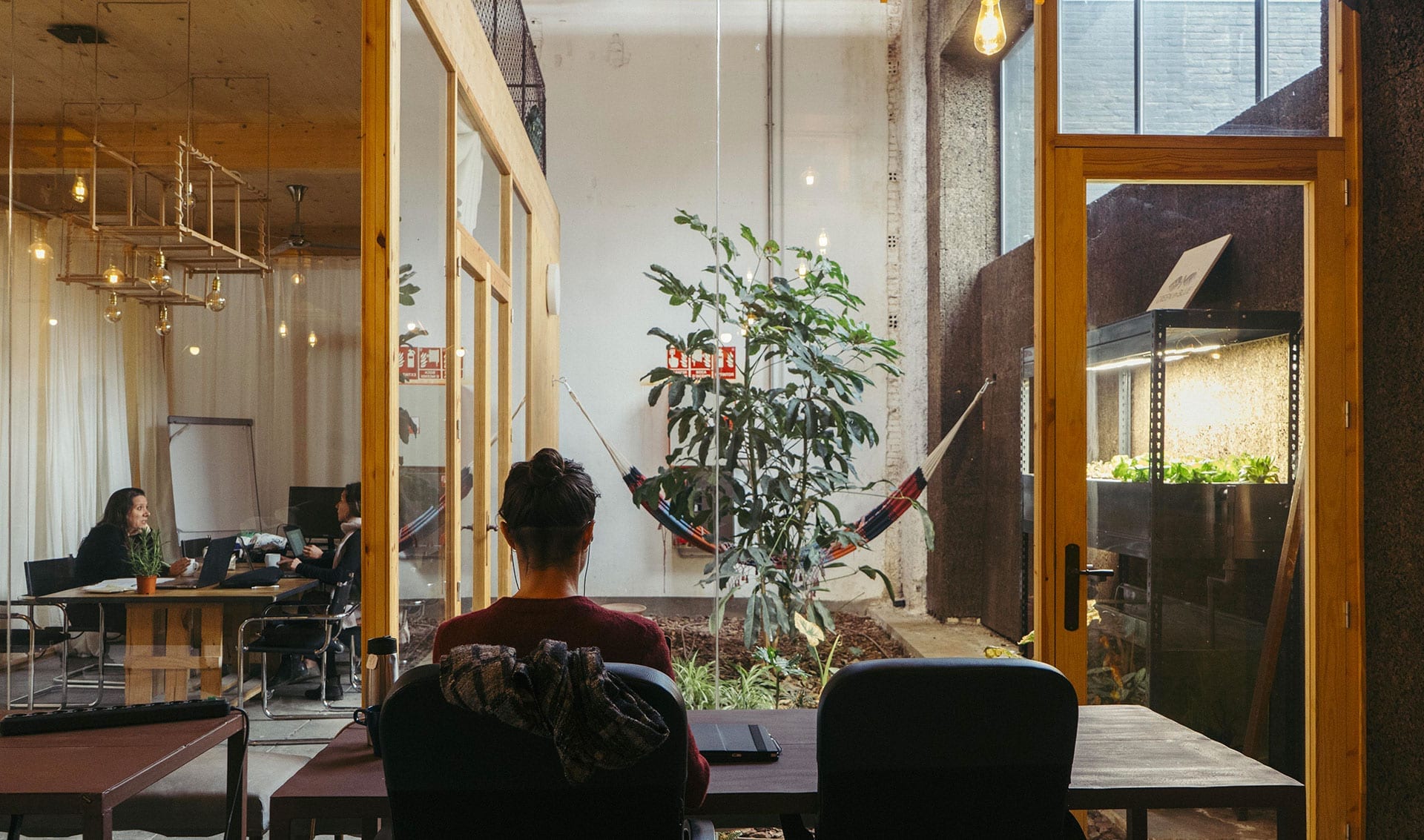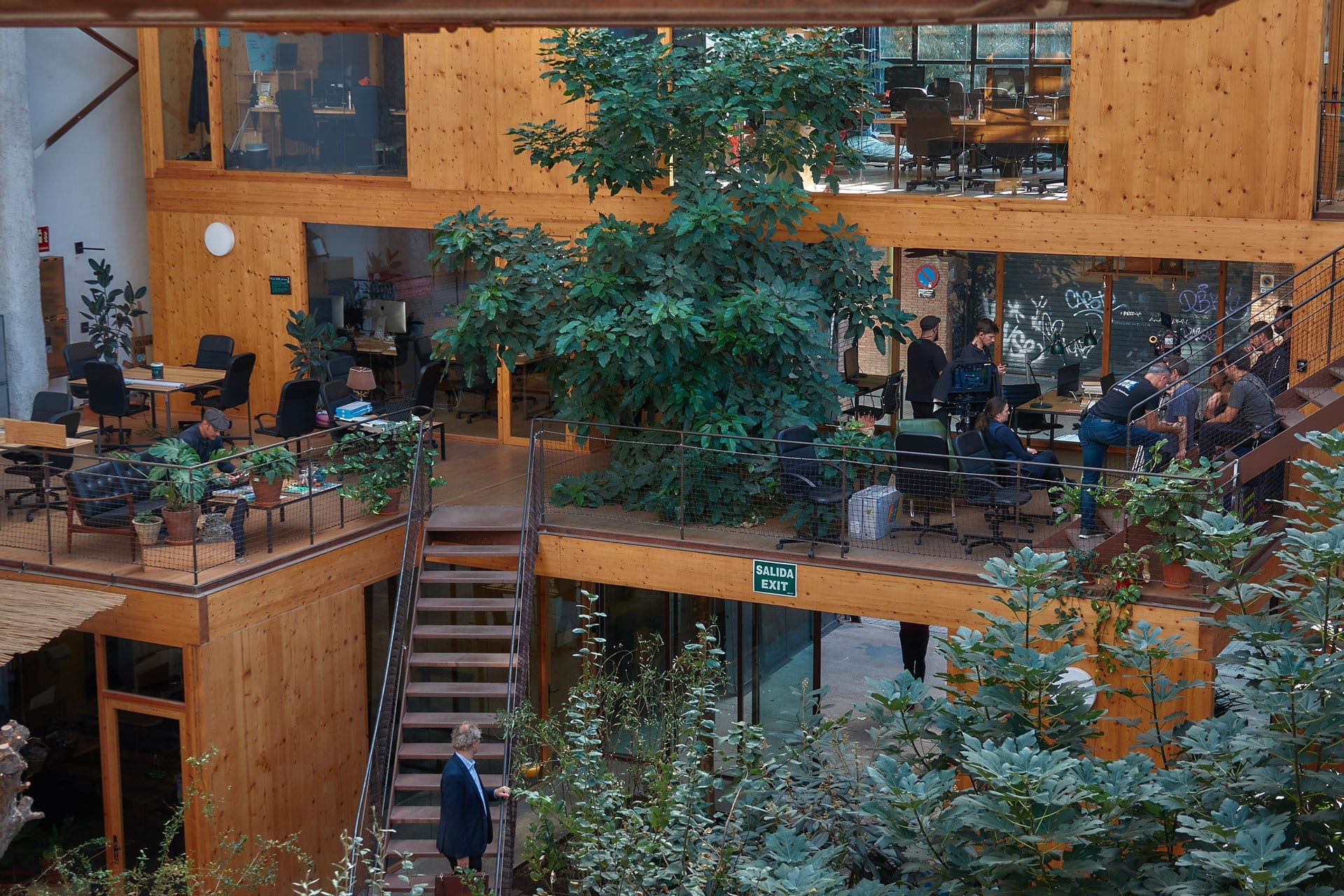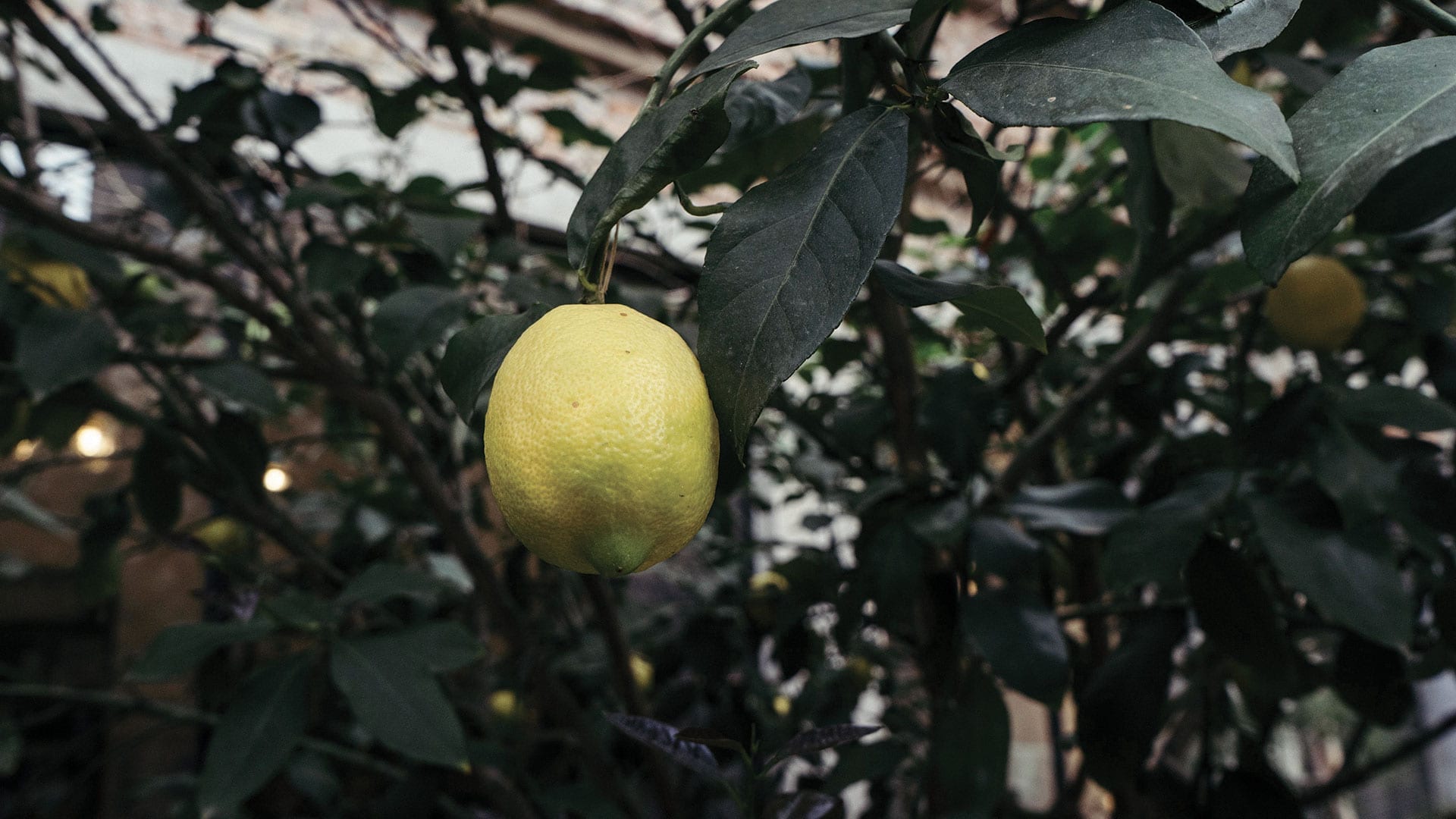Urban Permaculture in Barcelona: The Nest City Lab
Permaculture has become global but what is urban permaculture, and why does it matter? REVOLVE’s regional office in Barcelona’s Nest City Lab provides insights on what urban permaculture encompasses, and why this holistic phenomenon is important for a sustainable future.
Permaculture is a systems-thinking design methodology for sustainability. While most commonly associated with perennial or “permanent” agriculture, the concept’s scope has steadily expanded since its appearance in the 1970s. According to its initiators Bill Mollison and David Holmgren, permaculture focuses on creating “Consciously designed landscapes which mimic the patterns and relationships found in nature while yielding an abundance of food, fiber and energy for the provision of local needs. People, their buildings and the ways in which they organize themselves are central to permaculture. Thus, the permaculture vision of permanent or sustainable agriculture has evolved to one of permanent or sustainable culture” (Holmgren, 2002). At present, permaculture can simultaneously be viewed as a sustainable design methodology, a worldview informed by ethical principles, and a global movement present in remote areas as well as the world’s largest cities. The knowledge and techniques used in this approach are drawn from both modern technology and indigenous knowledge from around the world. In this sense, permaculture’s value lies in the fact that it ties together these practices into a holistic system for environmental, social and economic sustainability.

By 2050, 68% of the world’s projected 9.8 billion people will live in cities (United Nations, 2018). Understanding the many ways in which cities can become catalysts of sustainability and landscape regeneration in urban and peri-urban areas is crucial in the context of the upcoming United Nations Decade on Ecosystem Restoration (2021-2030). Somewhat counter-intuitively, cities are ideal locations for permaculture design, experimentation and innovation precisely because they are some of the most complex systems that humanity has ever developed. On the one hand, they concentrate most of the world’s inhabitants and resource consumption and can be seen as the main culprits of environmental degradation, resource over-abstraction and climate change. But according to permaculture’s design principles, the problem is also the solution. So what better place is there to begin saving ourselves (rather than the planet) than in our sprawling urban spaces? Cities also concentrate resources, creativity, power and community. They are therefore crucial platforms for sustainability and drivers of change. Their density and complexity are also their strength, since these qualities allow for the creation of new connections between different elements in the urban fabric to increase sustainability, community-building, resilience and resource efficiency.
What is the Nest City Lab?
The Nest City Lab is an “urban laboratory for sustainability”. It is located in the Poble Nou district of Barcelona, which has been undergoing large-scale redevelopment since the 2000s within the framework of the city council’s @22 program. This massive urban renovation aims at transforming the district into a hub for innovation, education and employment in key sectors. Within the context of @22, Apocapoc BCN’s future plans are to initiate the creation of eco-blocks (manzanas verdes) designed along sustainability and circular economy guidelines. These eco-blocks will preserve the industrial heritage of the neighborhood and help residents and businesses and to cluster their activities and innovate in the urban fabric (with co-living, rooftop gardening and greenhouses, to name but a few examples). It is within this context that Apocapoc BCN, the entity behind the Nest City Lab, decided to create an urban hub for sustainability.

Apocapoc BCN launched its first green shared working space in the medieval Born neighborhood in the center of Barcelona in 2013. Its co-founders decided to scale up their efforts by launching the much larger Nest City Lab in 2017. At present, this laboratory is an apt illustration of how citizen-led permaculture initiatives can have a positive and far-reaching impact on the urban fabric and city dwellers. The Nest’s leitmotiv is experimentation, or how citizens can catalyze bottom-up, systemic change for sustainability and resilient urban communities.
One of The Nest’s primary functions is to serve as a shared working space for around 170 individuals, working for companies or as freelancers. Going beyond the classical definition of a coworking space, The Nest is intended to be a place that encourages switching to sustainable daily habits, engaging in a life-long learning process and finding support in a community of practice. The ultimate goal of the space is to encourage the transition to a new culture focused on pro-active sustainability amongst “The Nesters”.
Green architecture
The building that houses the Nest City Lab is a striking example of green architecture in itself. Previously, this large industrial structure was used for metallurgy and carpentry. In 2017, The Nest team set out to upcycle its infrastructure by striving to attain the stringent certifications of the LEED (Leadership in Energy and Environmental Design) green building certification platinum standard. To meet the LEED criteria, The Nest team sourced most of its building materials within a 800-kilometer radius of Barcelona, using FSC-certified wood and recovered metal that was collected on-site. Whenever a resource or an element in the building could be recovered and upcycled, The Nest team did so, opting for recycled or second-hand furniture and equipment to attain its sustainability objectives and further reinforce its zero waste and circular economy approach. The certification also incorporates the waste recovery and management process during the construction phase, as well as on-site recycling on a day-to-day basis. Going a step further, The Nest team periodically audits its waste bins to assess the levels of recycling that are actually being achieved and provides reusable cutlery and utensils to its members in order to avoid the use of single-use plastics.
Water and energy
The Nest is designed to draw 30% of its water needs from Barcelona’s water supply network. The rest of the resource comes from rainwater harvesting, a well that was drilled on-site, as well as reused wastewater that is purified naturally in The Nest’s gardens using grey water from the building’s kitchens and showers. This water is used in the building’s toilets, as well as for watering the gardens and cleaning. The only water that is reintroduced into the public network is black water from the toilets. While these details may seem secondary, one can only imagine the impact on resource use and environmental quality that this approach would have at the scale of an entire city, generating employment and new sustainability-related knowledge in the process.

The Nest team’s objective was to produce renewable energy on-site. However, this option was not feasible due to the specificities of the building’s glass roof, its orientation, and regulations affecting the neighboring buildings. Instead, The Nest invested in a regional renewable cooperative, Som Energia, which provides green electricity to the space. Furthermore, all of the space’s devices and light-bulbs were selected for their energy efficiency, while heating and cooling is regulated by a central terminal that prevents over-consumption and encourages Nesters to improve their consumption habits and environmental footprint. The bioclimatic building’s breathable natural materials allows users to experience alternative means of achieving the right thermal comfort thanks to solar protection (shades), cross ventilation in the summer, and well insulated spaces and residual heat during the winter. The design also encourages Nesters to learn to live with the building’s vegetation, whichalso has specific needs.
Soil, food and nutrition
The Nest City Lab is also a hub for urban agriculture. It counts different forms of food production: vertical gardening, rooftop gardening, aeroponic gardening and permaculture gardens. The latter are designed to emulate the functioning of ecosystems while avoiding inputs such as fertilizers and pesticides, focusing on the organic production of edible or medicinal varieties as well as plants that are useful in creating soil or as building materials. These gardens also include an indoor “food forest,” symbolically placed in the center of the space, as well as a patio that counts numerous typically Mediterranean species. Food forests are designed along agro-ecological and agroforestry principles to once again emulate the functioning of forest ecosystems while producing food and materials, improving soil and allowing for the establishment of biodiversity for fauna and flora alike.
In line with its plant-based nutrition philosophy, The Nest also houses the Väcka organic and vegan nutrition project, which includes a cheese factory, as well as Cafeteria Botanica, an in-house vegetarian café. Some of the vegetables and fresh herbs produced at The Nest directly supply Väcka. In turn, all their organic waste (as well as The Nest’s) is either composted on-site or transported by bicycle to the nearby Connect Hort permaculture garden and community space. In Connect Hort, the project Abonokm0 (Compostkm0 in Spanish) transforms this organic waste into compost, which is then reused the area’s local gardens. This is but one example of how creating the right connections in dense urban spaces can yield local abundance as well as a host of environmental and economic benefits, from zero-kilometer production and reuse to significant savings in terms of the transport, conditioning, packaging and conservation of perishable goods.
Community and innovation
Permaculture is not only about land, water, energy, waste, green economics and technology. It is also, and perhaps most importantly, about education and culture. Numerous trainings on permaculture have been delivered to old and young in the space. The Nest City Lab also acts as a hub for education, experimentation and innovation, offering entrepreneurs and start-ups the possibility to test and improve their ideas. For instance, The Nest houses Tree Nation, which allows individuals to participate in reforestation projects around the world, the Luffa Shop which provides zero waste options online, Esferica, which uses recovered plastic chips to locally produce high-quality sunglasses, the Green in Blue aquaponics start-up which produces organic vegetables and fish in a closed-loop cycle, Green Living which provides consulting to create efficient and healthy buildings and Mon Petit Pot which offers workshops for DIY organic cosmetics. And of course, Slowup, the architecture firm that co-created the space constantly experiments on site with new systems and materials. Monthly charity actions are also organized at The Nest to help Barcelona’s most deprived populations with basic necessities and also stimulate sustainable projects through crowdfunding campaigns.

Another essential aspect of the space, and indeed of urban sustainability in general, resides in the “invisible structures” and “invisible services” that are provided by nature in the city. Within The Nest itself, this includes the air purification, water filtration, biodiversity and habitat for pollinators provided by the plants and green spaces, which are effectively providing valuable “ecosystem services” to the space. A more subtle service is also the sense of wellbeing that one can feel when working surrounded by vegetation.
The importance of urban permaculture in Mediterranean cities
Numerous other groups and spaces are currently active in Barcelona and the wider region of Catalunya. For instance, Permacultura Barcelona organizes permaculture and sustainability workshops in demonstration spaces and gardens located in Barcelona and Catalunya. Alternative spaces such as the Can Masdeu community have been trail-blazing urban sustainability through urban agriculture, sustainable design and neighborhood gardening spaces for nearly 20 years.

The same can be said of numerous regions of the Mediterranean, in which widespread permaculture experimentation in a multiplicity of forms is taking place, be it in urban and peri-urban spaces or rural areas. With its benign climate, rich fauna and flora, ancient agricultural traditions and cultural diversity, the Mediterranean has the potential to illustrate what sustainability resembles in a very real sense – in our cities, streets, homes, working places, in our villages and our fields. Sharing and replicating positive examples that instill optimism rather than anxiety is all the more important as the compound effects of climate change, land degradation, water scarcity and pollution become ever more apparent along its shores. As the example of the Nest City Lab illustrates, cities have an essential role to play in ensuring that the future of the region is one of abundance and integration rather than scarcity and fragmentation.
Find out more: apocapocbcn.com and #nestcitylab